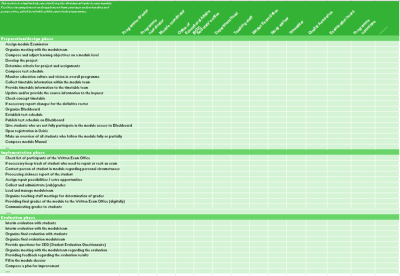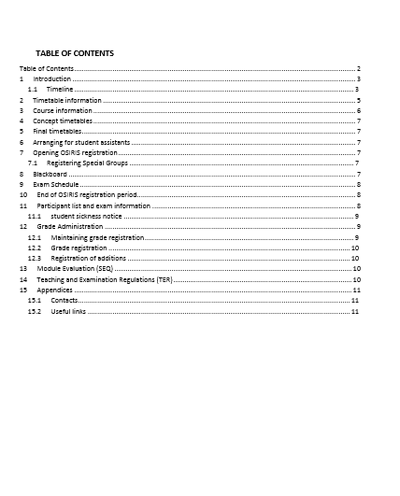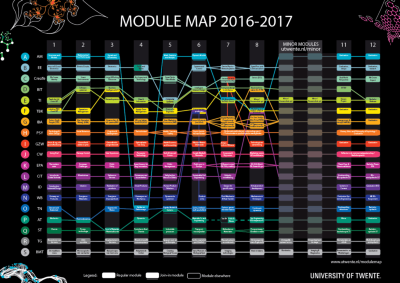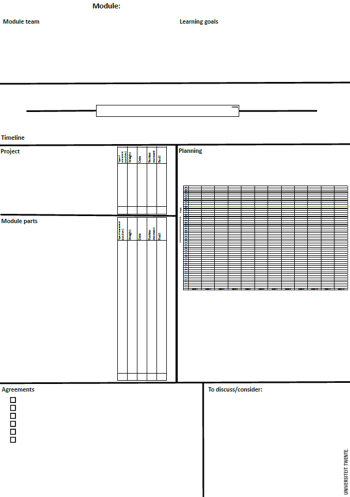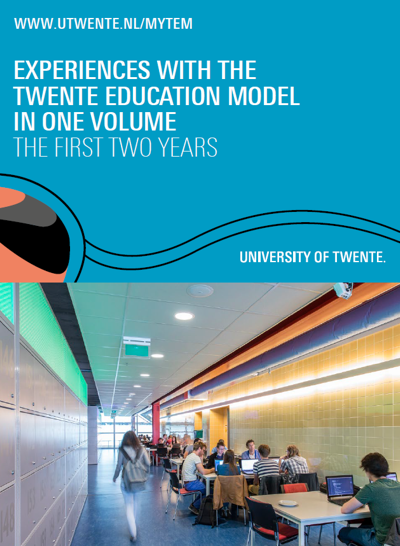At the University of Twente teachers work in teams on designing and implementing modules of 15EC. A module has one central 'theme' that connects the project and the other educational activities such as colstructions, practicals and lectures.
Every module has one coordinator. Although the tasks of the module coordinator differs among the programmes, the module coordinator has mostly an important role in initiating and chairing meetings, creating shared goals, keeping overview on the content, and monitor the organizational aspects of the module. In addition, a module coordinator has the task to keep contact with the programme director.
In this toolbox you will find several tools that can help (beginning and experienced) module coordinators with, for instance, module design, coordination or evaluation.
- TOM vision & philosophy
Like in any design process, it is good to start the design of a module or project with an overall goal or vision.
On an organizational level the University of Twente created a clear vision on bachelor education, resulting in a design framework: project based work in modules of 15 EC, Student-driven Learning and students working in three roles (researcher, designer and organizer). The vision of the University of Twente is that these three aspects will create high skilled UT professionals, who comply with the demands of the labour market.
How to translate this vision in the specific module is up to the moduleteam. What do you expect from students when it comes to planning? Which role(s) do they have to take in the different aspects of the module? Do they have to switch between several roles or should a certain role dominate? Working from a shared vision in the module makes it easier to create cohesion among the different learning activities which helps students to see underlying relationships in your discipline.
- Matrix for dividing module tasks
The overall role of the module coordinator is to have overview on the content and the organization of the module.
The specific tasks of the module coordinator differs among faculties. Some module coordinators may be spending their time more on creating integration and setting up assessment plans, while others spend most of their time on the administration tasks. This also depends on the role of the programme coordinator and the programme director in the programme management team.
This freedom in dividing tasks among the various teaching staff is highly appreciated. Therefore, there is no central description of what a module coordinator should or shouldn't do. Though, it is important to have clear agreements on who does what to prevent problems and extra work.
This tool -the matrix for dividing tasks- can be used to clarify the division of tasks within a module. Feel free to complement and supplement this matrix within your programme.
- Flow chart Modulecoordination tasks
Based on support requests from module coordinators, a meeting was arranged with some specialists to create a flowchart of the module coordination process. This flowchart can help you to get an overview of the coordination process, understand how steps in this process follow each other, and it provides you with some ideas that may help you manage the coordination tasks. In this flowchart a division is made between administrative, content related and organizational activities. This could be helpful in finding your focus and when you want to outsource some of your tasks.
- Module Budget
In every faculty there is a small, easily accessible budget available for a moduleteam. With this budget module teams have the oppertunity to do ‘fun’ stuff in the module, like team building, pizza sessions with students, or celebrating success, The idea is to strengthen both the feeling of appreciation and autonomy.
Ask your programme coordinator or programme director how to use this budget.
More information and ideas for spending the budget can be found on the website: www.utwente.nl/modulebudget
- CES cycle Educational Support for Modules
The Centre of Educational Support (CES) supports you as a module coordinator in several administrative tasks. Do you want to know when and where to provide information to CES and to expect information from CES? This poster gives you an overview.
- Format practical guide for modulecoordinator
The overall role of the module coordinator is to have overview on the content and the organization of the module. The specific tasks of the module coordinator differs among faculties. Some module coordinators may be spending their time more on creating integration and setting up assessment plans, while others spend most of their time on the administration tasks. This also depends on the role of the programme coordinator and the programme director in the programme management team. This freedom in dividing tasks among the various teaching staff is highly appreciated. Therefore, there is no central manual for a module coordinator.
A member of the teaching staff at the Science and Technology (TNW) faculty made a manual for module coordinators in their faculty. Based on this manual a format for a manual for the module coordinator has been made. By adapting this format for a specific faculty or programme the manual can be useful for the organizational aspects of your module. It will focus mainly on the activities that must be performed in cooperation with the Office of Educational Affairs (BOZ).
- Who to turn to with questions?
Who to turn to depends on your question:
- For questions regarding the content of the programme of the module, you can turn to the programme director of the programme in which you teach.
- For support questions regarding education and didactics, such as educational design, assessment, project-led education or using ICT, you can start by contacting the educational advisor of your faculty.
- For more general questions regarding the (implementation of) the Twente Education Model you can contact the Office of Educational Innovation:tom@utwente.nl or call 053 489 3755
- Evaluation of the module
At the UT all modules are automatically evaluated at the end of the quartile by the Student Experience Questionnaire (SEQ). The SEQ results are quantative results and show how students appreciate the module. These results can be used as a signal for further investigation. A valuable addition to the SEQ to get a more complete impression, is when it is combined with ‘panel meetings’ with students and/or teachers. The latter gives you the opportunity to collect more in-depth information about the module. The organization and structure of these panel meetings differ among the faculties. You can contact the quality assurance staff of your faculty for more information regarding the SEQ and panel meetings.
Besides evaluating the module at the end of the quartile, it is also important to conduct evaluation activities during the module. It can help you to recognize problems students experience, and to make adjustments during the module, if that is necessary. In some modules panel meetings are organized at the half of the quartile, whilst in other modules coordinators just informally ask a few students after a lecture or projectteam-meeting if they experience any problems.
At organization level, the implementation of TOM is also monitored. The SEQ results are complemented with comments from the programme director. Besides, all module coordinators are asked to fill in a short questionnaire about their module. These results, including rates from drop-outs, study exchange and study progress, are combined every quartile in a report to inform all committees within the UT. All reports are presented on the intranet page on the TOM website.
- Assessment Plan
An assessment plan is needed to create a clear overview of the relation between the learning objectives of the module and the final qualifications of the programme. An assessment plan helps you to ensure the validity and reliability for example by ordering the final qualifications, course content, course aims, assessment methods, and weighting of results.
The what, why and how of assessment in higher education received the last couple of years a lot of attention (Bailey, Floersheim & Ressler, 2002). Assessment can be used to determine the level of understanding of the students, but assessment can also be a very powerful learning tool.
An assessment plan gives insight in what and how you asses the students (on) and shows the balance between assessment of learning and assessment for learning.
The assessment for learning approach (Schuwirth & Van der Vleuten, 2011) can be summarized by more dispersed test administration, regular feedback and assessment as an integral aspect of the educational programme. This approach on assessment fits well with the UT vision on our bachelor education.
If you are interested you can go the website of Cambridge or 4TU who are also exploring the possibilities of assessment for learning.
- Module Map: overview of all UT modules
To contribute to both a logical and coherent curriculum, it is good to consider, as a module team, what and how students learn in the modules before and after their own module. The Utwente Module Map displays all 12 modules off all 19 bachelor programmes. By clicking on the modules your will be directed to the Osiris catalogue.
Note: as from 2018-2019 no new module maps were made. This is an old overview to give you an illustration. If you want to know more about the curriculum of a specific programme, visit the programme website.
- Whiteboard Poster for Moduleteam Meeting
The moduleposter is one of the products that was created during the ‘theme of the month’ project.
It is not easy to constantly have a clear overview of your module when you work with several teachers who have their own module units. The whiteboard moduleposter can help you create a clear overview for you and your team.
The module poster is a whiteboard A0 poster template. You can write on it with whiteboard markers and wipe it out. The template includes all important aspects you need to think of in the design phase and during the module.
The poster can for instance be convenient:
- for creating a new module design
- for redesigning an existing module
- as a checklist during the module
- as a guide during a moduleteam meeting
- as an update for the programme director or a new team member
Using the module poster might help you and your team creating structure and a clear overview. Structure and clear agreements for all team members prevents asking unnecessary questions to the module coordinator, programme coordinator or other team members.
Also, filling in the poster with your team creates insight and awareness in planning, work pressure, cohesion of module parts and the amount of assessments in the module. This can be very useful in creating a ‘smart’ module design that is effective and efficient.
You can order a poster by sending an email to the Office of Educational Innovations
We can support you in using the module poster.
Using the module poster is part of the training 'How to (re)design and implement your module' - Good practices & inspiration
If you want to change something in your module, for instance use peer feedback, integrated assessment or use a voting tool in your lectures, than it might be interesting to learn from experiences of your colleagues.
Look in the Module Map, read stories from teachers on the TOM website, or read experiences of teachers using technology in their education on the TELT website.

